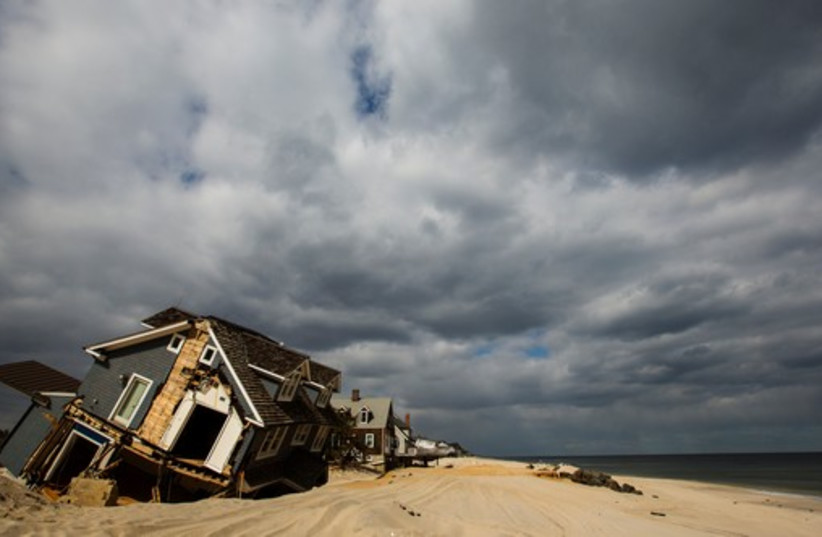Increasingly, the general public is acknowledging what climate scientists have been saying for many years – we are rapidly heading toward a climate catastrophe. We now know that there is little time to make the changes that might prevent it. Our traditions and teachings position Jews to play effective roles in humanity’s efforts to shift our imperiled planet onto a sustainable path.
In 2018, the Intergovernmental Panel on Climate Change (IPCC), an organization composed of climate experts from many countries, warned that “unprecedented changes” were needed by 2030 for the world to have a chance to avert a climate catastrophe. Despite that warning, atmospheric carbon dioxide continues to increase.
Indeed, UN Secretary-General Antonio Guterres stated that the climate situation is a “code red for humanity” and that “delay means death.”
The year 2022 was unprecedented for the frequency and severity of droughts, heat waves, wildfires, storms, and floods, with many records being broken.
Four climate change reasons our future looks frightening
As devastating as climate events have been recently, prospects for the future are even more frightening for four very important reasons:

- While all the recent severe climate events have occurred at a time when the global temperature has risen about 1.2 degrees Celsius (about 2.2 degrees Fahrenheit) since the start of the Industrial Revolution, climate experts project that this likely will at least triple by the end of this century, triggering far worse climate events.
- While climate experts believe that 350 parts per million (ppm) of atmospheric carbon dioxide is a threshold value to avert the worse effects of climate change, the world has reached 420 ppm and is increasing at 2-3 ppm per year.
- Climate experts fear that self-reinforcing positive feedback loops (vicious cycles) could result in an irreversible tipping point such that global warming will rise uncontrollably, with catastrophic results. One example is that as the world gets hotter, more air conditioning will be used, meaning that more fossil fuel will be burned. This will release more greenhouse gases, heating the atmosphere even more, resulting in still more use of air conditioning, etc.
- Military experts are warning that there will likely be tens of millions of desperate refugees fleeing from severe heat waves, droughts, wildfires, storms, floods, and other climate events, which will promote social and political instability, terrorism, and war. Severe droughts have already caused major migrations that contributed to civil wars in Sudan and Syria.
Because of the above factors, averting a climate catastrophe must become a central focus for civilization today. Every aspect of life should be considered in terms of reducing carbon footprints. We need to shift from fossil fuels to solar, wind, and other renewable forms of energy; produce more efficient cars, light bulbs, and other items; improve public transportation; recycle; and compost.
Jewish environmental teachings to fight climate change
Here are some examples of Jewish environmental teachings that should be applied in efforts to stabilize climate:
- The Jewish sages interpreted the dominion that God gave humans beings in Genesis 1 as responsible stewardship. This view is reinforced by Genesis 2:15, in which God tells Adam to till the land in the Garden of Eden but also to guard it. So, we are to be guardians of the Earth, co-workers with God in protecting the environment.
- The Jewish sages expanded Deuteronomy 20: 19, 20, which forbids the destruction of fruit-bearing trees in wartime, into a general prohibition against waste and unnecessary destruction.
AS PRESIDENT emeritus of Jewish Veg and author of Vegan Revolution: Saving Our World, Revitalizing Judaism, I want to stress the approach that has by far the greatest potential to help avert a climate catastrophe — a societal shift toward vegan diets. Such a shift would be consistent with Jewish teachings on preserving human health, treating animals compassionately, protecting the environment, conserving natural resources, reducing hunger, and pursuing peace.
Such a shift would significantly reduce greenhouse gas emissions because there would be far fewer cows and other farmed animals emitting methane, a very potent greenhouse gas with over 80 times the ability to heat up the planet as CO2 per unit weight during its 10-15 years in the atmosphere. It also has the potential of dramatically reducing CO2 currently in the atmosphere by permitting reforesting the over 40 percent of the world’s ice-free land that is being used for grazing and raising feed crops for animals. This could reduce the current very dangerous level of CO2 in the atmosphere to a much safer one. Unfortunately, the opposite is happening because forests continue to be destroyed for animal-based agriculture. We are literally eating our way to extinction.
Taking into account the “opportunity cost” of not permitting reforestation to draw CO2 out of the atmosphere, systems engineer Sailesh Rao argues in his paper “Animal Agriculture Is the Leading Cause of Climate Change,” published in the Journal of Ecological Society, that animal agriculture is responsible for 87% of human-caused greenhouse gases.
Bottom line: To have a chance for a decent, habitable, environmentally sustainable world for future generations, there must be a society-wide shift toward vegan diets. A utopian dream? Perhaps. But as the title of a book by Buckminster Fuller puts it, we may have a choice today between “Utopia or Oblivion.” And it could be a dream come true if people became aware that they can obtain plant substitutes with nearly identical appearance, texture, and taste of meat and other animal products.
It is essential that meat consumption be sharply reduced and that major reforestation occur. There is no Planet B. Nor is there an effective Plan B. ■
